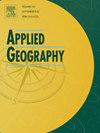通过隐含能源与增值转移之间的不匹配揭示全球能源不平等
IF 5.4
2区 地球科学
Q1 GEOGRAPHY
引用次数: 0
摘要
全球隐含能源贸易在塑造能源获取和公平模式方面发挥着关键作用,但其对能源福利的影响仍未得到充分探讨。本研究通过分析隐含能源转移与其产生的经济价值之间的差异,考察了2000年至2019年141个国家和地区贸易中隐含能源福利的分布。结果表明,隐含能源贸易的不平衡显著地重塑了能源获取。美国和欧盟(EU)等发达经济体从贸易中的能源盈余中获得了不成比例的好处。相比之下,新兴制造业国家,如中国,以及资源依赖型经济体,如沙特阿拉伯,经历了大量的实体能源外流。具体增值转移的结构也发生了重大转变,从集中式结构转向更加多样化和分散化的网络结构。中国和俄罗斯等国已成为主要的附加值出口国,而美国和英国已成为主要进口国。这些模式反映了全球能源福利的不对称,发达经济体通过贸易获得能源和经济收益,处于“受益区”的核心,而欠发达经济体往往位于“损失区”,提供能源密集型出口,却得不到相应的经济补偿。此外,南南贸易的兴起进一步加剧了这些不平等。这些发现为全球能源福利分配及其对贸易公平和公平的影响提供了见解。本文章由计算机程序翻译,如有差异,请以英文原文为准。
Unveiling global energy inequality through the mismatch between embodied energy and value-added transfer
Global trade in embodied energy plays a critical role in shaping patterns of energy access and equity, yet its implications for energy welfare remain insufficiently explored. This study examines the distribution of energy welfare embedded in trade across 141 countries and regions from 2000 to 2019 by analyzing the divergence between embodied energy transfers and the economic value they generate. The results reveal that imbalances in embodied energy trade have significantly reshaped energy access. Developed economies, such as the US and the EU, benefit disproportionately through energy surpluses in trade. In contrast, emerging manufacturing countries, such as China, and resource-dependent economies, like Saudi Arabia, experience substantial embodied energy outflows. The structure of embodied value-added transfers has also undergone a major transformation, shifting from a centralized configuration to a more diversified and decentralized network. Countries such as China and Russia have emerged as dominant exporters of value-added, while the US and the UK have become major importers. These patterns reflect a global asymmetry in energy welfare, with developed economies positioned at the core of “beneficiary zones” by capturing both energy and economic gains through trade, while less developed economies are often situated in “loss zones,” contributing energy-intensive exports without proportional economic compensation. Moreover, the rise of South–South trade has further exacerbated these inequities. The findings provide insights into the global energy welfare distribution and its implications for trade fairness and equity.
求助全文
通过发布文献求助,成功后即可免费获取论文全文。
去求助
来源期刊

Applied Geography
GEOGRAPHY-
CiteScore
8.00
自引率
2.00%
发文量
134
期刊介绍:
Applied Geography is a journal devoted to the publication of research which utilizes geographic approaches (human, physical, nature-society and GIScience) to resolve human problems that have a spatial dimension. These problems may be related to the assessment, management and allocation of the world physical and/or human resources. The underlying rationale of the journal is that only through a clear understanding of the relevant societal, physical, and coupled natural-humans systems can we resolve such problems. Papers are invited on any theme involving the application of geographical theory and methodology in the resolution of human problems.
 求助内容:
求助内容: 应助结果提醒方式:
应助结果提醒方式:


